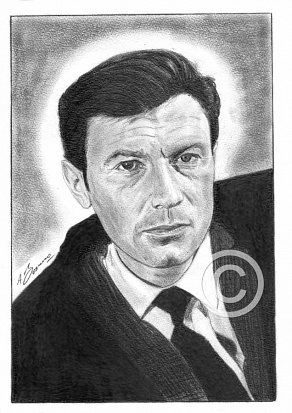Laurence Harvey
Pencil Portrait by Antonio Bosano.

Shopping Basket
The quality of the prints are at a much higher level compared to the image shown on the left.
Order
A3 Pencil Print-Price £45.00-Purchase
A4 Pencil Print-Price £30.00-Purchase
*Limited edition run of 250 prints only*
All Pencil Prints are printed on the finest Bockingford Somerset Velvet 255 gsm paper.
P&P is not included in the above prices.

Recommended viewing
Room at the top (1959)
Widely credited for kick-starting the whole ‘kitchen sink drama’ genre, “Room at the Top” would also breath fresh life back into an ailing British film industry, then undergoing a period of deep retrenchment as a result of the television revolution. Box office takings had fallen from £108m at the start of the 1950s to £64m by the end of the decade. By 1957, television had overtaken radio as the most broadcast medium in the UK and, although Rank and ABC fought back with more colour, more glamour and, in many cases, more Brylcreem, their efforts were not enough to prevent picture houses closing countrywide. Whilst some much needed commercial impetus would be provided by two very lucrative British screen franchises – Hammer’s Dracula series and the Carry On films, both of which demonstrated that there was still a domestic demand for British films – clearly something more was required to apply fresh impetus.
In the month of my birth – January 1959, now a long time ago sadly! – film-goers would be tempted into their local ABC cinema by a poster promising “A Savage Story of Lust and Ambition”. The X-certificate also hinted at some continental-style abandon, the French leading lady a radical departure from the normally reserved English rose.
Even by today’s standards, ‘Room at the Top’ is merciless in its evocation of the casual cruelties of English provincial life, and Harvey, despite a vaguely disconcerting “Bradford” accent, excels in the role of Joe Lampton, facing little but sneers and derision from the officer caste in his battle for self-improvement. Its is not so much his working-class roots that enrage him as the glass ceiling he encounters in his pursuit of success. His relatives tell him to “stick to your own kind” but Joe now has no connection with his own background nor with the ex-wartime officers who seemingly populate the town’s provincial elite.
Despite his social aspirations, attaining the post of local government accountant will remain the very pinnacle of his professional achievement – his lower-middle class destiny encapsulated in the second-hand Austin and semi-detached villa he will own by age forty. However, as the film unfolds, Joe still perceives a limitless horizon, and driven by smoldering ambition to overcome his modest circumstances, he finally obtains a position in AJ Brown’s company and begins his difficult journey to “the top” while including marriage to Brown’s daughter Susan (Heather Sears) among his ultimate objectives. Along the way, he meets an older but still attractive Frenchwoman, Alice Aisgill (Simone Signoret) with whom he has an affair. For Joe, it is clearly a mere dalliance along his career path; she, however, falls in love with him. Beyond the passionate sex which she professes to enjoy as much as he does, Alice also helps Joe to refine his social graces, increasing his understanding and appreciation of the cultural arts. Joe seems grateful for her contributions to his self-improvement but really has no long-term interest in her. He remains obsessed with reaching “the top” with wife Susan at his side, possessing great wealth, power, and prestige.
Ultimately Joe’s been nowhere and isn’t going anywhere – a career revelation that came to me in my 40’s – yet before the onset of wisdom, he will still be capable of exploiting Alice rather callously, her tragic death the catalyst for some serious soul searching.


Comments
Laurence Harvey divides opinion. More than forty years after his premature death at the age of forty five, it remains nigh impossible to form any obvious opinion of the man as either an actor or a person, so polarised being the recollections of those who knew him.
If he was a hustler, then he was also decidedly ambitious, a not uncommon trait in the young. If his reptilian good looks, bisexuality and outward affability endeared him to a number of important theatrical people, then they were equally prepared to be charmed. So consumed as they are with their own aura, we must credit him with sufficient charisma to divert their attention from themselves.